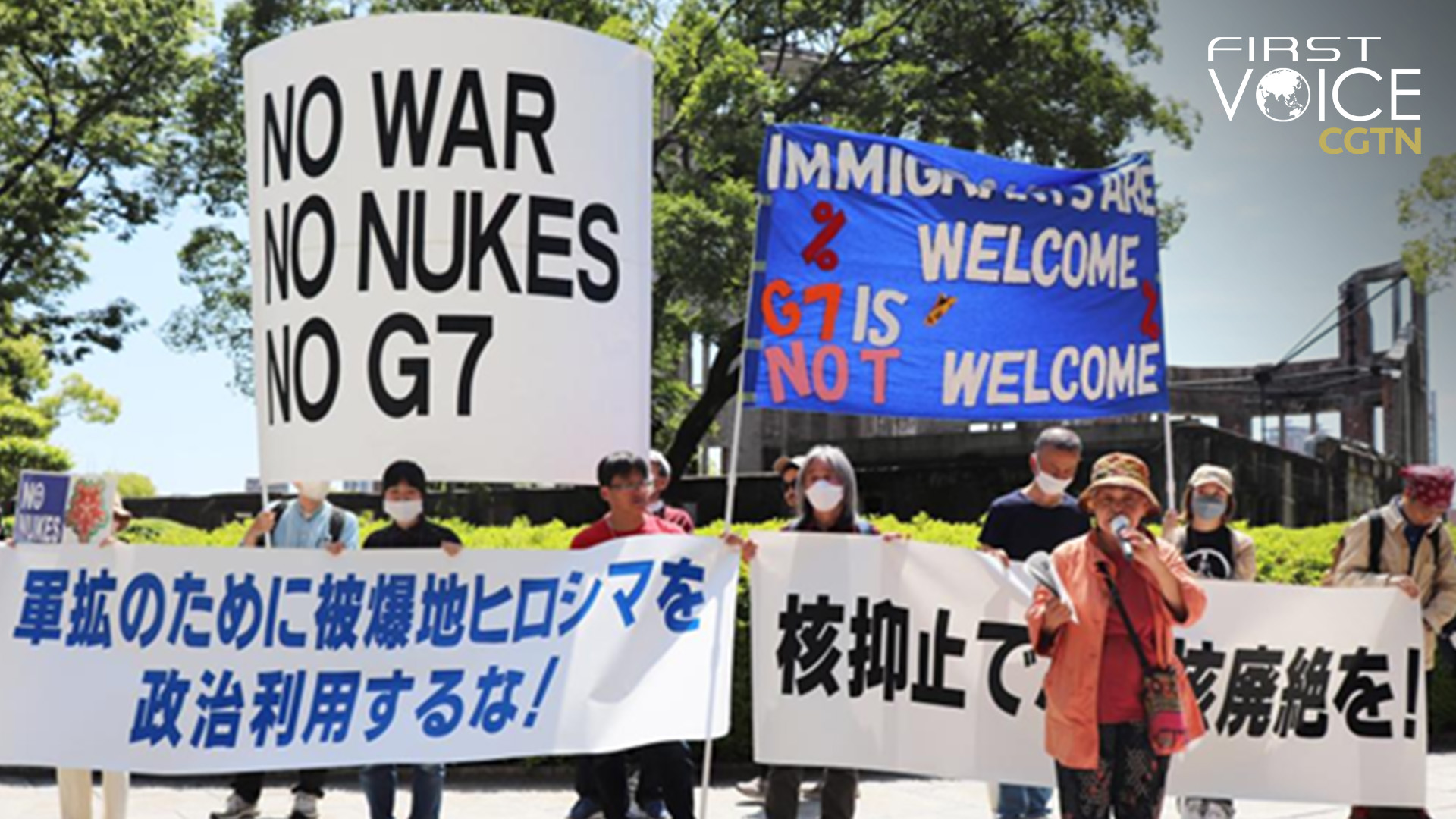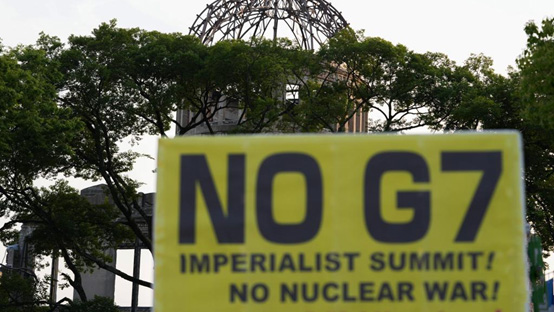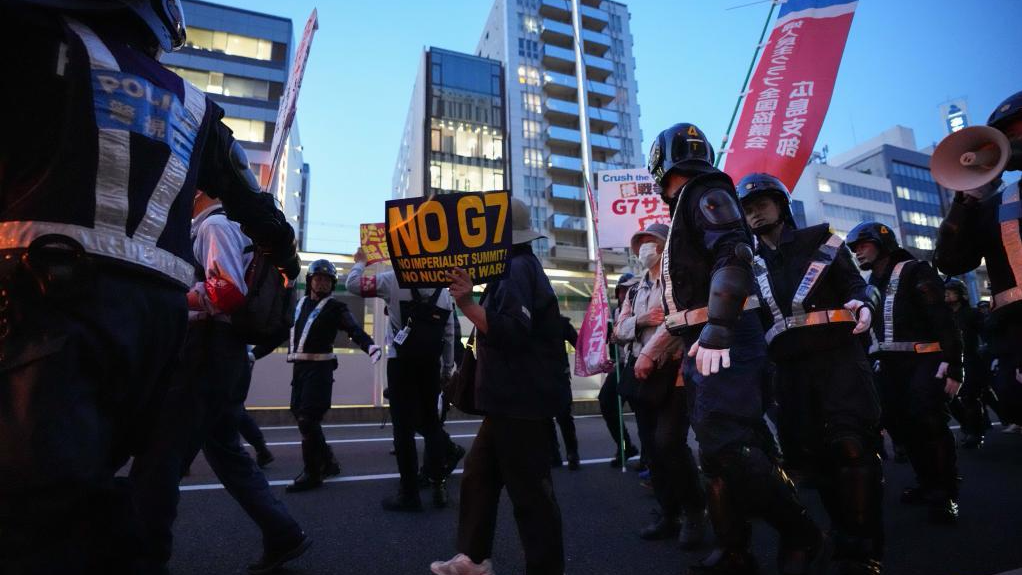
People holding banners protest against the Group of Seven (G7) summit at the site of the atomic bombing near the Peace Memorial Park in Hiroshima, Japan, May 14, 2023. /Xinhua
People holding banners protest against the Group of Seven (G7) summit at the site of the atomic bombing near the Peace Memorial Park in Hiroshima, Japan, May 14, 2023. /Xinhua
Editor's note: CGTN's First Voice provides instant commentary on breaking stories. The column clarifies emerging issues and better defines the news agenda, offering a Chinese perspective on the latest global events.
The annual Group of Seven (G7) kicks off in Hiroshima, Japan, this Friday. G7 is supposed to discuss the energy crisis, debt, climate change, slowing economy and other global challenges. However, the so-called China's "economic coercion" will top the agenda, according to CNN reports. The Summit will also incorporate consensus on China-related issues in the joint statement.
The U.S. and Japan have long written their "China threat" playbook for this Summit. While Washington seeks to contain China with its Indo-Pacific strategy, Japan is happy to play the role as a vanguard for U.S. hegemony. Taking advantage of this Summit, the two countries are thinking to woo all G7 members into their camp. "China threat" is a convenient tool to consolidate anti-Beijing circle and split the world.
Urging China to abide by international rules, the G7 Summit blatantly challenges the post-war international order. Most countries uphold the purposes and principles of the UN Charter as the basic norms of international relations. Washington's "rule-based international order" has nothing to do with this – it is a U.S.-invented product to challenge post-war international rules.
Abiding by the rules, the G7 must pay the UN what it has owed for years, withdraw illegal military personnel from Syria, stop pouring nuclear-contaminated water into the sea, and refrain from stoking splits and tensions in the world.

A slogan is pictured at the Hiroshima Peace Memorial Park in a protest against the Group of Seven (G7) summit, in Hiroshima, Japan, May 17, 2023. /Xinhua
A slogan is pictured at the Hiroshima Peace Memorial Park in a protest against the Group of Seven (G7) summit, in Hiroshima, Japan, May 17, 2023. /Xinhua
With economic security as an important agenda, the G7 Summit turned a blind eye and even encouraged Washington's decoupling attempts. In recent years, the U.S. has been abusing the concept of national security to willfully impose export bans on others, intensify restraints on normal economic and trade cooperation, instigate and even coerce allies to follow suit, and disrupt the stability of global industrial chain. If G7 countries really care about the security of global economy, they should urge the U.S. to stop attempts in dividing the world into two sets of markets and systems.
Touting about joint actions on "economic coercion," G7 Summit has turned a deaf ear to U.S. economic coercion and bullying. The U.S. – from dollar hegemony to different forms of trade sanctions, to long-arm jurisdiction – has been adept at using economy as leverage to coerce others into obeying its own will. Japan has been a victim of U.S. economic coercion. Interestingly, it is now pioneering to serve U.S. interests. Other G7 members chose to either be deaf or act submissive on U.S. economic coercion.

Protesters rally in a protest against the Group of Seven (G7) summit, in Hiroshima, Japan, May 17, 2023. /Xinhua
Protesters rally in a protest against the Group of Seven (G7) summit, in Hiroshima, Japan, May 17, 2023. /Xinhua
Japanese Prime Minister Fumio Kishida voiced against unilaterally changing the status quo with force. Japan itself has been expanding its military and even calls for hosting U.S. nuclear weapons. The country has launched militaristic invasive wars against others. Instead of behaving cautiously, Japan in recent years have accelerated its attempts in shifting its security policies and challenging Constitution.
Labeling itself as a victim of nuclear bombs and calling to establish a nuclear-free world, Japan is ironically enjoying protection from the U.S. nuclear umbrella. Taiwan's return to China is a component of the post-war international order. The G7 is hypocritical to label China's opposition against pro-independent forces as "changing" the status quo across the Straits.
Japan is seeking to profit from U.S. wrongful China policy and offers convenience for Washington to set anti-China agendas in the G7 Summit. Under the manipulation of Japan, G7, with its influences dwindling on the global arena, has descended into the servant of U.S. hegemony. Failing to address urgent international challenges, it can only hype up China-related issues to prove its existence.
Just as Volker Tschapke, honorary president of Germany's Prussian Society, put it, G7 represents the old era. The U.S.'s and Japan's coercion of the G7 to split the world will for sure bring about serious harms to countries' development, as well as peace and stability of the world.
(If you want to contribute and have specific expertise, please contact us at opinions@cgtn.com. Follow @thouse_opinions on Twitter to discover the latest commentaries in the CGTN Opinion Section.)